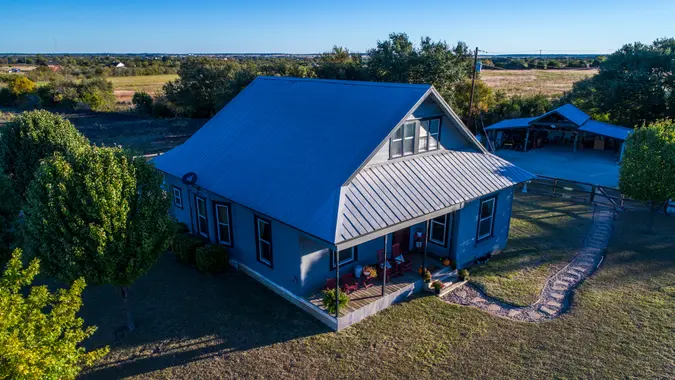Mortgage Points: What Exactly Are They?

Commitment to Our Readers
GOBankingRates' editorial team is committed to bringing you unbiased reviews and information. We use data-driven methodologies to evaluate financial products and services - our reviews and ratings are not influenced by advertisers. You can read more about our editorial guidelines and our products and services review methodology.

20 Years
Helping You Live Richer

Reviewed
by Experts

Trusted by
Millions of Readers
Mortgage points, also called discount points, are prepaid interest you pay at closing in exchange for a lower interest rate on your mortgage loan.
Although points require more cash upfront, prepaying some of your interest reduces your monthly payment and can greatly reduce the total cost of your loan. That’s why purchasing mortgage points is called “buying down” your mortgage.
How Do Mortgage Points Work?
In most cases, a mortgage point is 1% of your mortgage loan amount, purchased at closing, that reduces your interest rate by 0.25%. On a $300,000 loan at 7% interest, one point would cost $3,000 and reduce your interest rate to 6.75%.
You don’t necessarily have to purchase whole points. You might pay $7,500 to buy 2.5 points on a $300,000 loan, for example, and reduce your interest rate by 0.625% to 6.375%.
How Many Can You Buy?
Although there’s no legal limit on how many points you can buy, there are limits on closing costs lenders can charge. For this reason, lenders generally cap points at 4% or less.
What Are Origination Points?
Also known as origination fees, this is how your mortgage lender earns money from all of the work they did to put together your mortgage. Some lenders roll these fees into the overall cost of the mortgage and others will list them out.
Although they can occasionally be negotiated, you will have to pay your lender some kind of origination fee.
When Should You Purchase Mortgage Points?
Here are some ways mortgage points can work in your favor.
1. Mortgage Points Can Reduce Your Monthly Payments
The best thing about mortgage points is that they reduce the cost of your loan. You can take advantage of that benefit either by reducing your mortgage payment or putting the savings toward your principal balance and paying your loan off early.
The mortgage points calculators found on various lenders’ websites show you how that plays out in real terms. For example, the $300,000 loan with two points that reduces the interest rate from 7% to 6.5% would cost you an additional $6,000 at closing but save you more than $35,000 over the life of the loan.
2. Mortgage Points Are Tax Deductible
When you use the mortgage loan to buy or build your primary home, and that home secures the mortgage loan, the IRS generally allows you to deduct mortgage points in the same year you pay them.
You can also deduct points on a refinance loan in the same year you pay them as long as you use the loan proceeds to improve your main home. Even on mortgage loans with points, you can’t deduct in the same year, you may deduct a prorated portion each year over the life of the loan.
When Mortgage Points Aren’t Right For You
If you’re not careful, mortgage points can work against you.
You Need Your Extra Cash
It can be a stretch for a buyer to come up with extra cash for closing. If that’s true for you, buying points upfront would deplete cash reserves you could put toward a larger down payment — thereby reducing your interest by reducing your loan amount — or sock away in an emergency fund.
You Plan to Move or Refinance Soon
Because you pay interest a little at a time over the life of your loan, it can take years before you break even on the lump sum you pay upfront for points. This might not matter if you’re planning to stay in your home until the loan is paid off. Otherwise, use an online points calculator to do the math.
Paying two points, or $6,000, to reduce interest on a $300,000 mortgage from 7% to 6.5% would cost $2,722 more over the first three years you own the home than if you’d applied that extra $6,000 to your down payment. The break-even point comes in the fifth year, and by year six you’d have saved $621. If you sell your home before you break even, the points will have cost you more than they saved you in interest.
You Have an Adjustable Rate Mortgage
This is an especially important consideration for borrowers planning to buy a home with an adjustable-rate mortgage because the rate discount usually only applies to the initial fixed-rate period. You might be better off with a slightly higher rate on a loan that resets after three or five years.
How to Buy Mortgage Points
Ask your lender about purchasing mortgage points. They can help you price out how many points you can afford and if it would help you save money in the long run.
GOBankingRates’ Homebuying Guides
- 7 Things You Should Know Before Buying a House
- How Much Should You Save for a Down Payment on a House?
- Condo vs. House: Which Option Is Best For You?
- Home Inspection Costs and Why You Need One
- House Hacking 101: Top Tips and Advice
- Home Inspection Checklist: The Ultimate List of Items to Look For
- How To Flip a House: Your Step-By-Step Guide
- What Is Mortgage Insurance and How Does It Work?
- How To Refinance a Mortgage
- Mortgage Closing Costs: What They Are and How Much You Can Expect To Pay
- How To Find Small Home Loans Under $50K
- How To Rent Out a House in 9 Steps
- What Does It Mean To Be House Poor?
Our in-house research team and on-site financial experts work together to create content that’s accurate, impartial, and up to date. We fact-check every single statistic, quote and fact using trusted primary resources to make sure the information we provide is correct. You can learn more about GOBankingRates’ processes and standards in our editorial policy.
- U.S. Bank "What Are Mortgage Points and How Do They Work?"
- Chase. "Mortgage Points Calculator | Home Lending."
- Quicken Loans. 2020. "Mortgage Points: Are They Worth It?"
- IRS. 2021. "Topic No. 504 Home Mortgage Points."
- MortgageLoan.com. "Mortgage Points Calculator - Should You Buy."
- American Financing. "Mortgage Points Explained: What They Are & How They Work"
 Written by
Written by  Edited by
Edited by 

























